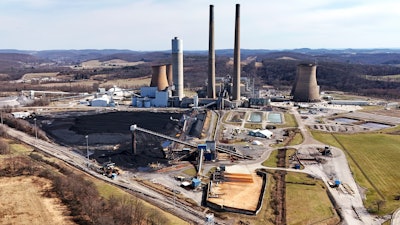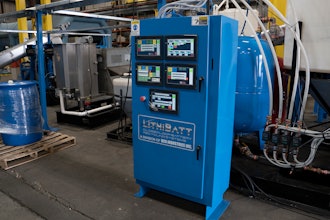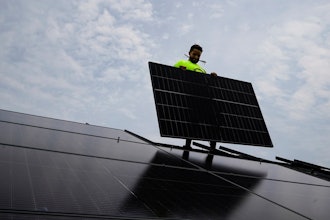
SCRANTON, Pa. (AP) — Pennsylvania Gov. Josh Shapiro unveiled a plan Wednesday to fight climate change, saying he will back legislation to make power plant owners in the nation's third-biggest energy-producing state pay for their greenhouse gas emissions and require utilities to buy more electricity from renewable sources.
Such legislation would make Pennsylvania the first major fossil fuel-producing state to adopt a carbon-pricing program. But it is drawing fierce opposition from business interests wary of paying more for power and will face long odds in a Legislature protective of the state's natural gas industry.
Shapiro's proposal comes as environmentalists are pressuring him to do more to fight climate change in the nation's No. 2 gas-producing state and as the state's highest court considers a challenge to his predecessor's plan to adopt a carbon-pricing program. It also comes after many of the state's biggest power polluters, coal-fired plants, have shut down or converted to gas.
At a news conference in Scranton, nicknamed the "Electric City," Shapiro said his plan will make Pennsylvania competitive in a clean energy economy, improve electricity reliability, cut greenhouse gas emissions and lower electricity bills.
It is long past time for lawmakers to act, he said.
"If they choose to do nothing, they're choosing to be less competitive in an environment that demands us to bring excellence to the table every single day," Shapiro said. "They're choosing to fall behind if they choose to do nothing."
Under Shapiro's plan, Pennsylvania would create its own standalone carbon-pricing program, with most of the money paid by polluting power plants — 70% — going to lower consumer electric bills. No one will pay more for electricity and many will pay less, Shapiro said.
Meanwhile, utilities would be required to buy 50% of their electricity from sources that are mostly carbon-free by 2035, up from the state's current requirement of 18%.
Currently, about 60% of the state's electricity comes from natural gas-fired power plants, and the 50% renewables requirement could hurt demand for electricity from those plants. Another third of Pennsylvania's electricity is from nuclear plants — which are not included in the 50% renewables requirement — and the rest from coal and renewables.
Republicans who control the state Senate have pushed to open greater opportunities for natural gas production in Pennsylvania, and have warned that carbon-pricing could raise electricity bills, fray the electricity grid, hurt in-state energy producers and drive new power generation to other states.
"Families are feeling the strain of inflation and increased household expenses, which must be a chief concern when implementing any changes to energy policy," Senate Majority Leader Joe Pittman, R-Indiana, said in a statement Wednesday.
Shapiro's administration did not provide many details of his strategy Wednesday, including how much it would reduce greenhouse gases, how much money power plants would pay or how it would affect the average household electric bill.
Patrick Cicero, Pennsylvania's consumer advocate, said the amount of savings on electric bills will depend on usage — large industrial customers would see more and low-income households would get "significant reductions" because of a planned expansion of the state's energy-assistance program.
For the average household, "it's not going to be much," Cicero said, "but it's not costing households more. That's a win-win."
Neighboring Maryland, New Jersey and New York have set requirements to draw 50% or more of their electricity from renewables by 2030, prompting warnings that Pennsylvania risks falling behind in a clean energy economy.
Robert Bair, president of the Pennsylvania State Building and Construction Trades, whose members work on power plants, refineries and pipelines, said Pennsylvania energy policy must protect workers in the coal and gas industries. But he also said Pennsylvania will lose clean energy jobs to other states if it does nothing.
Heavy energy users and coal-industry businesses slammed Shapiro's "energy tax" as posing a damaging blow to industries and a fatal blow to the state's few remaining coal-fired power plants.
The Marcellus Shale Coalition, which represents Pennsylvania's enormous natural gas industry, was more circumspect. The most pressing challenge is ensuring the electric grid is stable and reliable, said Dave Callahan, the group's president.
Despite the lack of details, Shapiro's plan drew statements of support from renewable energy trade associations and environmental advocates.
"Even what the governor has proposed is not enough to meet the needs of addressing the climate crisis, but it's a huge step forward from where Pennsylvania is now," said Alex Bomstein, executive director of the Clean Air Council.
Meanwhile, environmental advocates worry about abandoning the plan produced by Shapiro's predecessor, former Gov. Tom Wolf.
For the time being, a state court has blocked Wolf's regulation that authorizes Pennsylvania to join the multistate Regional Greenhouse Gas Initiative, which imposes a price and declining cap on carbon dioxide emissions from power plants.
As a candidate for governor, Shapiro had distanced himself from Wolf's plan — although critics said Shapiro's plan is similar — and Shapiro wouldn't say Wednesday whether he'd enforce Pennsylvania's participation in the regional consortium should the courts uphold it and the Legislature do nothing.
"I'm focused on getting these things passed," Shapiro said.






















